-
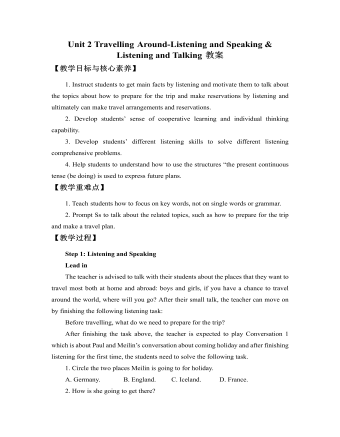
新人教版高中英语必修1Unit 2 Travelling Around-Listening and Speaking & Listening and Talking教案
【教学目标与核心素养】1. Instruct students to get main facts by listening and motivate them to talk about the topics about how to prepare for the trip and make reservations by listening and ultimately can make travel arrangements and reservations. 2. Develop students’ sense of cooperative learning and individual thinking capability. 3. Develop students’ different listening skills to solve different listening comprehensive problems.4. Help students to understand how to use the structures “the present continuous tense (be doing) is used to express future plans.【教学重难点】1. Teach students how to focus on key words, not on single words or grammar.2. Prompt Ss to talk about the related topics, such as how to prepare for the trip and make a travel plan.【教学过程】Step 1: Listening and SpeakingLead inThe teacher is advised to talk with their students about the places that they want to travel most both at home and abroad: boys and girls, if you have a chance to travel around the world, where will you go? After their small talk, the teacher can move on by finishing the following listening task:Before travelling, what do we need to prepare for the trip?
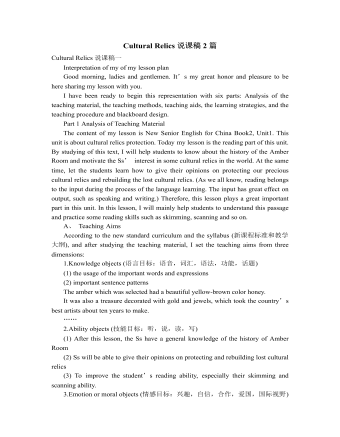
人教版高中英语必修2Cultural Relics说课稿2篇
Ⅲ. Analysis of the teaching material:The topic of this unit is cultural relics. Students are quite interested in topics about different cultures around the world. This is the second period of the whole unit. As a reading class, the passage mainly talks about the history of the amber room (how it was made, sent as a gift, lost and rebuilt).According to the new national curriculum, when teaching reading, much emphasis should be put on training the students’ reading skills.Ⅳ. Teaching objectives1. Language objectives:1) Students are required to master the key words and phrases occurred in the passage (e.g. amazing, decorate, belong, in return, less than etc.)2) Students are required to learn the attributive clause and acquire the sentence pattern.2. 1) Students are required to describe a certain thing by using the new sentence patterns.2) Students are required to master two kinds of reading skills—skimming and scanning, and learn to use them in their daily reading.3. 1) Students are required to know the history of the amber room.2) Students are required to appreciate cultural relics and understand the importance of protecting them.Ⅴ. Teaching important and difficult points1) the new words, phrases, and sentence pattern in the course of reading.2) Teaching difficult point: Help the students master two kinds of reading skills—skimmingand scanning and learn to apply them in daily use.Ⅵ. Teaching methods:Task-based method & Top-down model Ⅶ. Teaching aids: PPT, pictures, blackboard Ⅷ. Teaching procedure:
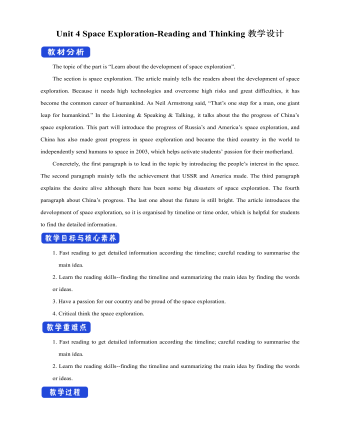
新人教版高中英语必修3Unit 4 Space Exploration-Reading and Thinking教学设计一
Q4: What is the function of the International exploration ?Having astronauts from different countries on boardQ5: What can you learn from Para 4 ?China has made great achievements in exploring spaceQ6: What is the attitude to the space exploration ?SupportiveStep 6 Post reading---RetellPeople have always wanted to learn more about space. Before the mid-20th century, most people felt (1)_________ (travel) into space was an impossible dream. However, (2)____ the help of scientists, peoplesucceeded in realizing their dream (3) _________ (explore) space. On 4 October 1957, the Sputnik 1 satellite (4) ____________(launch) by the USSR. (5) ________________ scientists try to make sure nothing goes wrong, accidents can still happen. These disasters made everyone(6)___________(disappoint), but people still believe in the importance of (7) ________(carry) on space exploration. In 2003, China became the third country to (8)_____________ (independent) send humans into space. Then Shenzhou 6 and 7 completed (9)____ second manned orbit and the first Chinese spacewalk. In spite of the difficulties, scientists hope future (10)__________ (discovery) will not only enable us to understand the universe but also help us survive well into the future.Answers: 1. travelling 2. with 3. to explore 4. was launched 5. Although6. disappointed 7. carrying 8. independently 9. a 10. discoveriesStep 6 Post reading---Critical thinkingQ1: What do you think of the space exploration ? I think it is beneficial to us. Through further study of space, people will make full use of it in the future, such as the space experiments by Wang Yaping in Tian Gong 1.Q2: If you are determined to be an astronaut, what should you prepare at present ?First of all, I should study hard to get a related college degree. Besides, I must keep mental and physical healthy.Step 7. HomeworkTry to summarize the structure of the article by a mind map.
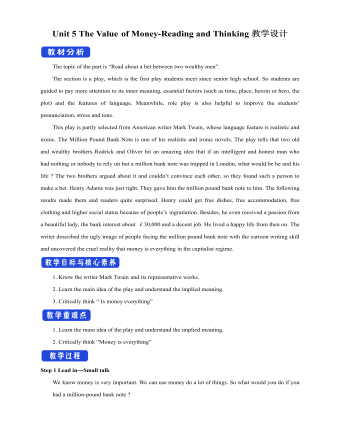
新人教版高中英语必修3Unit 5 The Value of Money-Reading and Thinking教学设计一
Everybody wants to get wealth.In today’s material world,making money or becoming wealthy symbolizes a person’s success and capability. Many people just make every effort, pay any price to attain greater wealth. With money,they can buy nice, large apartments in nice neighborhood. With money they can own luxurious cars. Wealth seems to bring all happiness in life.But is wealth the only road to happiness? Not really. There are many things in the world, which are beyond the means of money, such as friendship, love, health and knowledge. People are so preoccupied with struggling for money that they have no time or would not take the time to form or maintain friendship. What happiness can they feel living as lonely miserable creatures without love or friends in the world even if they accumulate tremendous wealth?In my opinion, people can’t do anything without money, but money is not everything. What money will bring you depends on your personal belief and goal in life. If you are kind enough to help others, especially the poor, money is a good thing to you. With it, you can do much more for the benefit of people and your country, and it will add to your own happiness. If you want money just for your own needs, you’ll never be satisfied or happy. In a word,you should have money spent for more people. Only then can money be the source of your happiness.Step 8 Homework4 students in a group, one acts Roderick, one Oliver, one servant and the fourth one acts Henry Adams, then listen to the tape, pay more attention to the difference between American English and British English in pronunciation, stress, tone.
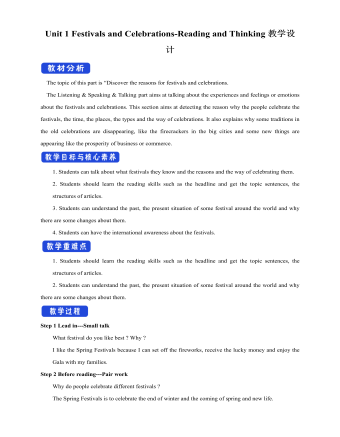
新人教版高中英语必修3Unit 1 Festivals and Celebrations-Reading and Thinking教学设计
The topic of this part is “Discover the reasons for festivals and celebrations.The Listening & Speaking & Talking part aims at talking about the experiences and feelings or emotions about the festivals and celebrations. This section aims at detecting the reason why the people celebrate the festivals, the time, the places, the types and the way of celebrations. It also explains why some traditions in the old celebrations are disappearing, like the firecrackers in the big cities and some new things are appearing like the prosperity of business or commerce. 1. Students can talk about what festivals they know and the reasons and the way of celebrating them.2. Students should learn the reading skills such as the headline and get the topic sentences, the structures of articles.3. Students can understand the past, the present situation of some festival around the world and why there are some changes about them. 4. Students can have the international awareness about the festivals.1. Students should learn the reading skills such as the headline and get the topic sentences, the structures of articles.2. Students can understand the past, the present situation of some festival around the world and why there are some changes about them.Step 1 Lead in---Small talkWhat festival do you like best ? Why ?I like the Spring Festivals because I can set off the fireworks, receive the lucky money and enjoy the Gala with my families.Step 2 Before reading---Pair workWhy do people celebrate different festivals ?The Spring Festivals is to celebrate the end of winter and the coming of spring and new life.The Mid-autumn Day is to celebrate the harvest and admire the moon.
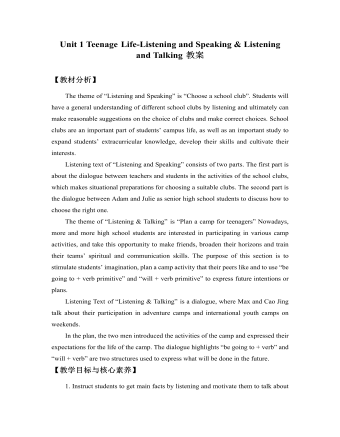
新人教版高中英语必修1Unit 1 Teenage Life-Listening and Speaking & Listening and Talking教案
Step 2 Listening and Talking1. The teacher is advised to talk with their new students about the related topic: Boys and girls, do you know some structures to talk about future activities? Talking about future activitiesWe’ll …I plan to …There’ll be …I hope to …We’re going to …2. After their small talk, the teacher can move on by playing the listening and solve the following task.Underline the expressions in the sentences below Cao Jing and Max use to talk about the future.We’ll learn useful skills.I plan to improve my spoken English.There’ll be students from different schools.I hope to make new friends.We’ll talk about teenage life.I’ll learn to make a fire.There’ll be students from different countries at the camp.There’ll be some experts there to show us how to live in the wild.We’re going to learn about wildlife.I’m going to give a speech.I think I’m going to enjoy the activities.I think we’ll have a lot of fun.3. Work in groups. Plan a youth camp.Teacher make the Ss think of ideas for the camp. And they can use the questions below to get started. And have the Ss present their ideas for a youth camp to the class.●What kind of camp is it?●Who will be there?●What will they do?●What will they learn?
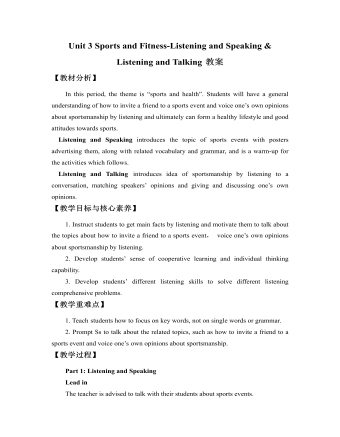
新人教版高中英语必修1Unit 3 Sports and Fitness-Listening and Speaking & Listening and Talking教案
Finally, after finishing the task above, the teacher is expected to instruct students to work in groups to finish the following project:Speaking ProjectWhat event or activity would you like to invite your friend to? Make a conversation with a partner.Ski Race: Zhangjiakou, a beautiful city in northern China, will host the Youth Ski Race in December.Track Meet: a great event for track –and –field lovers on 26 October.Gym Class: come and work out at a gym! You can make it.Part 2: Listening and Talking:The teacher is advised to talk with their new students about the related topic: Boys and girls , what do you think of sportsmanship? Let’s listen and find out:Play the listening and match each opinion with the right speaker. Who do you agree with? Why?Cao Jing _____________ Lily _____________ Max _____________A. An athlete should do his/her best to win.B. The girl should stop and help the other girl. Good sportsmanship is more important than wining!C. An athlete should think about honor and his/her fans if he/she is competing for his/her country.Listen again and circle the expressions that you hear in the conversation.
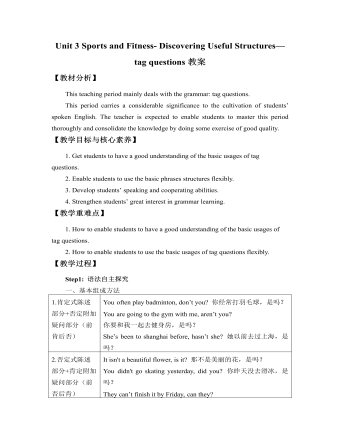
新人教版高中英语必修1Unit 3 Sports and Fitness- Discovering Useful Structures—tag questions教案
【教材分析】This teaching period mainly deals with the grammar: tag questions.This period carries a considerable significance to the cultivation of students’ spoken English. The teacher is expected to enable students to master this period thoroughly and consolidate the knowledge by doing some exercise of good quality.【教学目标与核心素养】1. Get students to have a good understanding of the basic usages of tag questions.2. Enable students to use the basic phrases structures flexibly.3. Develop students’ speaking and cooperating abilities.4. Strengthen students’ great interest in grammar learning.【教学重难点】1. How to enable students to have a good understanding of the basic usages of tag questions.2. How to enable students to use the basic usages of tag questions flexibly.【教学过程】Step1: 语法自主探究一、基本组成方法1.肯定式陈述部分+否定附加疑问部分(前肯后否) You often play badminton, don’t you? 你经常打羽毛球,是吗?You are going to the gym with me, aren’t you?你要和我一起去健身房,是吗?She’s been to shanghai before, hasn’t she? 她以前去过上海,是吗?2.否定式陈述部分+肯定附加疑问部分(前否后肯) It isn't a beautiful flower, is it? 那不是美丽的花,是吗?You didn't go skating yesterday, did you? 你昨天没去滑冰,是吗?They can’t finish it by Friday, can they?他们不能在星期五之前完成,是吗?
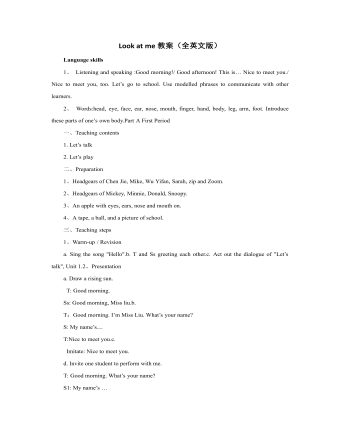
人教版新课标PEP小学英语三年级上册Look at me教案(全英文版)
3、Practicea. Nice to meet you. Nice to meet you,too.b. Perform the dialogue.c. Arrange the dialogue according to the pictures or sentence cards.d. Let’s play.A: Good afternoon,B. This is C. Hello, C! Nice to meet you.C: Nice to meet you, too.A,B: Goodbye!C: Bye!4、Assessment Workbook page 10Add-activitiesa. Listen to the recording and repeat.b. Make a dialogue according to "Let’s talk".Second Period一、Teaching contents1. Let’s learn Words:body, leg, arm, hand, finger, foot.1. Let’s do二、Preparation1、a puppet2、Cards of body, leg, arm, hand, finger and foot.3、headgear of a captain三、Teaching steps1、Warm-up/ Revisiona. Captain says to review "let’s do" of Part A.b. Perform the students their own dialogues.2、Presentationa. Learn to say "body, leg, arm, hand, finger and foot."b. Listen to the recording and repeat.c. Let’s do. Clap your hands. Snap your fingers. Wave your arms. Cross your legs. Shake your body. Stamp your foot.3、Practicea. Let’s draw a person.b. Let’s do. Point out which picture.c. Let’s do. Who responses faster.4、Assessment Workbook page 115、Add-activitiesa. Listen to the recording, repeat and act out.b. Say all the names of the body to your parents.Third Period一、Teaching contents1. Let’s check2. Let’s chant二、Preparation1、stationeries1、pictures of parts of Zoom
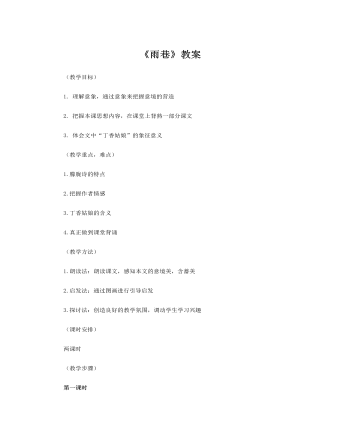
人教版高中语文必修1《雨巷》教案
(三)作家介绍,写作背景大家说“雨巷”这首诗写得美不美?(美)刚才我也说了,这首诗是中国朦胧诗的百年经典。那么对于这么出名的诗,有谁能够向我们介绍一下它的作者跟写作背景呢?(明确:戴望舒,原名戴朝实又名戴梦鸥,1905年出生于杭州。1929年4月出版第一本诗集《我底记忆》,他的成名作《雨巷》即收入此集中。1933年8月出版了《望舒草》1948年出版了《灾难岁月》一生留下了诗篇92首。《雨巷》是戴望舒的成名作和前期的代表作,他曾因此而赢得了“雨巷诗人”的雅号。这首诗写于1927年夏天。当时全国处于白色恐怖之汇总,戴望舒因曾参加进步活动而不得不避居于松江的友人家中,在孤寂中咀嚼着大革命失败后的幻灭与痛苦,心汇总充满了迷惘的情绪和朦胧的希望。)(适当板书)
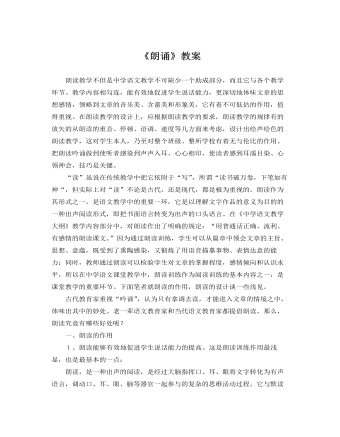
人教版高中语文必修1《朗诵》教案
教师在教学古诗时,只有指导学生反复朗读,才能让学生直接体会到古诗所具有的音乐美,增强学生对古诗的美学感染力,进一步激发学生学习古诗词的热情。除此,在《荷塘月色》、《春》等优美的写景抒情散文中,朱自清运用了不少的叠词,朗读它们,犹如一个个跳动的音符贯穿于文章中,有效地增强了文章的节奏感。通过朗读,学生能够更好地领悟到朱自清散文所具有的音乐美。4、朗读能够增强学生对文章含蓄美和形象美的感染能力:含蓄,是指用少量的、具体的、可感触的艺术形象,来表现丰富的生活内容和思想感情,把诗意藏在富于概括性和内涵丰富的形象中,以瞬间表现永恒,以有限传达无限,以少胜多,给人以推理和想象的广阔大地。“读书百遍,其义自见”,“熟读唐诗三百首,不会作诗也会吟”,“观书须熟读,使其言皆者出于吾云之口;继以精思,使其意皆出于吾之心。”这些话语道出了反复朗读对于理解文章含义所起的重要作用。教师在课堂教学过程中,特别是地教学诗歌时,只有指导学生反复地朗读,才能让学生将文章中隽永的意境,深厚的蕴涵更好地品味出来,从而更好地欣赏到文章的含蓄美。
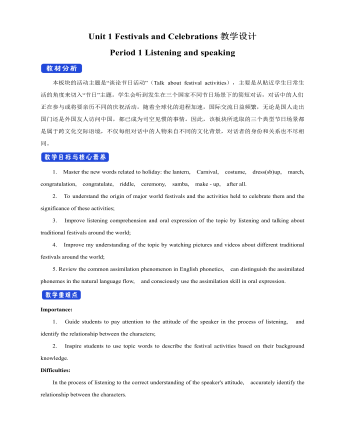
新人教版高中英语必修3Unit 1 Festivals and Celebrations教学设计一
本板块的活动主题是“谈论节日活动”(Talk about festival activities),主要是从贴近学生日常生活的角度来切入“节日”主题。学生会听到发生在三个国家不同节日场景下的简短对话,对话中的人们正在参与或将要亲历不同的庆祝活动。随着全球化的进程加速,国际交流日益频繁,无论是国人走出国门还是外国友人访问中国,都已成为司空见惯的事情。因此,该板块所选取的三个典型节日场景都是属于跨文化交际语境,不仅每组对话中的人物来自不同的文化背景,对话者的身份和关系也不尽相同。1. Master the new words related to holiday: the lantern, Carnival, costume, dress(sb)up, march, congratulation, congratulate, riddle, ceremony, samba, make - up, after all. 2. To understand the origin of major world festivals and the activities held to celebrate them and the significance of these activities;3. Improve listening comprehension and oral expression of the topic by listening and talking about traditional festivals around the world;4. Improve my understanding of the topic by watching pictures and videos about different traditional festivals around the world;5. Review the common assimilation phenomenon in English phonetics, can distinguish the assimilated phonemes in the natural language flow, and consciously use the assimilation skill in oral expression. Importance:1. Guide students to pay attention to the attitude of the speaker in the process of listening, and identify the relationship between the characters;2. Inspire students to use topic words to describe the festival activities based on their background knowledge. Difficulties:In the process of listening to the correct understanding of the speaker's attitude, accurately identify the relationship between the characters.
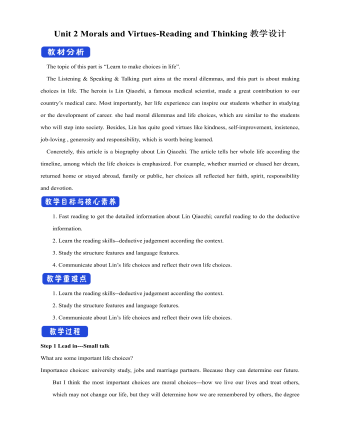
新人教版高中英语必修3Unit 2 Morals and Virtues-Reading and Thinking教学设计
The topic of this part is “Learn to make choices in life”.The Listening & Speaking & Talking part aims at the moral dilemmas, and this part is about making choices in life. The heroin is Lin Qiaozhi, a famous medical scientist, made a great contribution to our country’s medical care. Most importantly, her life experience can inspire our students whether in studying or the development of career. she had moral dilemmas and life choices, which are similar to the students who will step into society. Besides, Lin has quite good virtues like kindness, self-improvement, insistence, job-loving , generosity and responsibility, which is worth being learned.Concretely, this article is a biography about Lin Qiaozhi. The article tells her whole life according the timeline, among which the life choices is emphasized. For example, whether married or chased her dream, returned home or stayed abroad, family or public, her choices all reflected her faith, spirit, responsibility and devotion.1. Fast reading to get the detailed information about Lin Qiaozhi; careful reading to do the deductive information.2. Learn the reading skills--deductive judgement according the context.3. Study the structure features and language features. 4. Communicate about Lin’s life choices and reflect their own life choices.1. Learn the reading skills--deductive judgement according the context.2. Study the structure features and language features.3. Communicate about Lin’s life choices and reflect their own life choices.Step 1 Lead in---Small talkWhat are some important life choices?Importance choices: university study, jobs and marriage partners. Because they can determine our future.
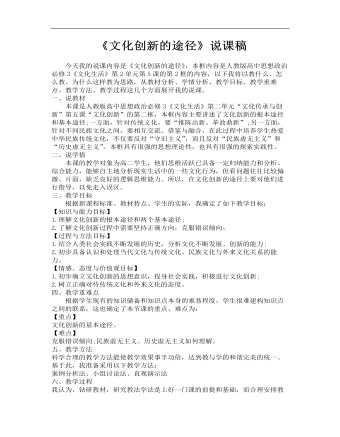
高中思想政治人教版必修三《文化创新的途径》说课稿
二、说学情本课的教学对象为高二学生,他们思维活跃已具备一定归纳能力和分析、综合能力,能够自主地分析现实生活中的一些文化行为,但看问题往往比较偏激、片面,缺乏良好的逻辑思维能力。所以,在文化创新的途径上要对他们进行指导,以免走入误区。三、教学目标根据新课程标准、教材特点、学生的实际,我确定了如下教学目标:【知识与能力目标】1.理解文化创新的根本途径和两个基本途径;2.了解文化创新过程中需要坚持正确方向,克服错误倾向。
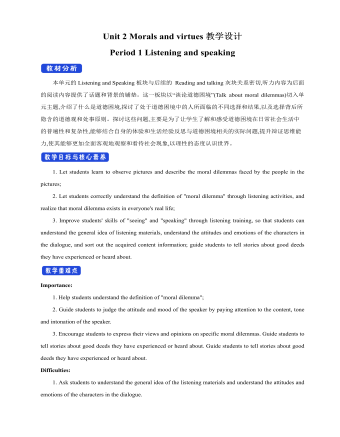
新人教版高中英语必修3Unit 2 Morals and virtues教学设计一
(2) students are divided into groups according to the requirements of activity 3. Each student shares a story of personal experience or hearing-witnessing kindness, and then selects the most touching story in the group and shares it with the whole class. Before the students share the story, the teacher can instruct them to use the words and sentence patterns in the box to express. For example, the words in the box can be classified:Time order: first of all, then, after that, later, finally logical relationship :so, however, although, butTeachers can also appropriately add some transitional language to enrich students' expression:Afterwards, afterwards, at last, in the end, eventuallySpatial order: next to, far from, on the left, in front ofOtherwise, nevertheless, as a result, therefore, furthermore, in addition, as well asSummary: in a word, in short, on the whole, to sum up, in briefStep 8 Homework1. Understand the definition of "moral dilemma" and establish a correct moral view;2. Accumulate vocabulary about attitudes and emotions in listening texts and use them to express your own views;3. Complete relevant exercises in the guide plan.1、通过本节内容学习,学生能否理解理解“道德困境”的定义;2、通过本节内容学习,学生能否通过说话人所表达的内容、说话的语气、语调等来判断其态度和情绪;3、通过本节内容学习,学生能否针对具体的道德困境发表自己的看法和见解,能否掌握听力理训练中的听力策略。
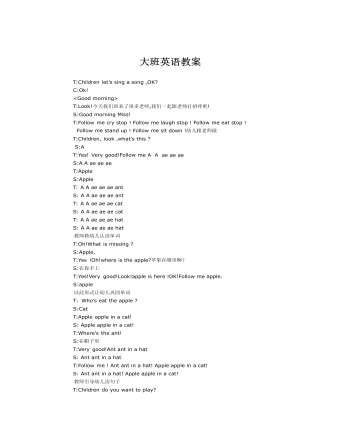
英语公开课教案
<Good morning> T:Look!今天我们班来了很多老师,我们一起跟老师打招呼吧! S:Goodmorning Miss! T:Follow mecry stop ! Follow me laugh stop ! Follow me eat stop ! Follow me stand up ! Follow me sit down !幼儿跟老师做 T:Children,look ,what’s this ? S:A T:Yes! Verygood!Follow me A A ae ae ae S:A A ae aeae T:Apple S:Apple T: A A ae aeae ant S: A A ae aeae ant T: A A ae aeae cat S: A A ae aeae cat T: A A ae aeae hat S: A A ae aeae hat
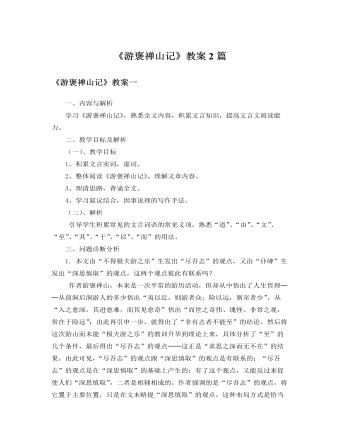
人教版高中语文必修2《游褒禅山记》教案2篇
1.本文由“不得极夫游之乐”生发出“尽吾志”的观点,又由“仆碑”生发出“深思慎取”的观点,这两个观点彼此有联系吗?作者游褒禅山,本来是一次平常的游历活动,但却从中悟出了人生哲理──从前洞后洞游人的多少悟出“夷以近,则游者众;险以远,则至者少”,从“入之愈深,其进愈难,而其见愈奇”悟出“而世之奇伟、瑰怪、非常之观,常在于险远”;由此再引申一步,就得出了“非有志者不能至”的结论。然后将这次游山而未能“极夫游之乐”的教训升华到理论上来,具体分析了“至”的几个条件,最后得出“尽吾志”的观点──这正是“求思之深而无不在”的结果。由此可见,“尽吾志”的观点跟“深思慎取”的观点是有联系的:“尽吾志”的观点是在“深思慎取”的基础上产生的;有了这个观点,又能反过来促使人们“深思慎取”,二者是相辅相成的。
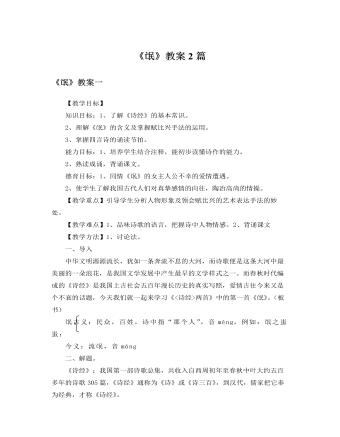
人教版高中语文必修2《氓》教案2篇
从《诗经》的现实主义到屈原的浪漫主义,是中国诗歌发展的一个里程碑。屈原的骚体诗,依诗取兴,引类譬喻,继承发展了《诗经》的比兴传统。《诗经》的比兴较为单纯,而《楚辞》的比兴具有象征的特质,往往成为一个形象的系统。《离骚》中香草美人的比兴就是范例。楚地本是泽乡山国,其间颇有叠波旷宇、崇山秀岭,这些江山的光怪之气足以摇荡心灵、催发丽辞伟句。但骚体诗已冲破《诗经》四言诗的固定格式,句式加长而灵活,篇章放大而严密,诗采绚丽而贴切,是《诗经》之后的一次诗体大解放。有人说,中国历代诗“莫不同祖风骚”,足见其对后代诗歌的影响。先秦时代,《诗经》与《楚辞》双峰并峙,是中国诗史上现实主义与浪漫主义的两座巍然屹立的坐标。
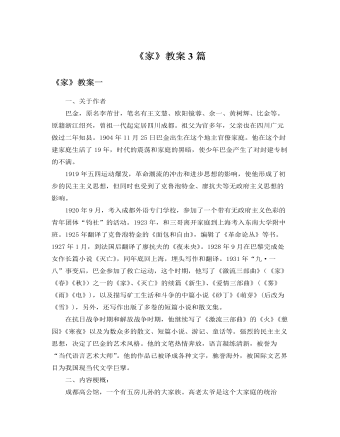
人教版高中语文必修2《家》教案3篇
(幻灯六)巴金作品《家》描写的是“五四”之后,成都地区一个封建大家庭走向崩溃的故事。故事集中在1920年冬到1921年秋的八九个月时间里。成都的一个官僚地主家庭高公馆,一家之主的高老太爷,封建专制,顽固不化。长房长孙觉新,为人厚道,却很软弱,原与梅表姐相爱,后屈从于老太爷之命而与李瑞珏结婚。后来梅和瑞珏双双惨死。觉新的胞弟觉民、觉慧积极参加爱国运动,从而和冯公馆的冯乐山成了死对头。觉民爱上琴,冯乐山却要他娶自己的侄孙女,在觉民觉慧的反抗下,他们终于取得胜利。觉慧爱上聪明伶俐的婢女鸣凤,但冯乐山却指名要娶鸣凤为妾,鸣凤坚决不从,投湖自尽…至此,觉新有所觉醒,而觉慧则毅然脱离家庭,投身革命。(故事主要以高家三兄弟的爱情遭际为线索。)
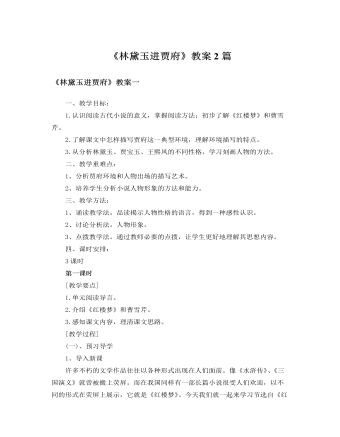
人教版高中语文必修3《林黛玉进贾府》教案2篇
2、黛玉进入贾府到贾母处,她看到了什么?提示:从荣府西角门进去,走“一射之地”,转至垂花门,过穿堂,绕插屏,再经三间过厅,后面方是贾母居住的正房大院。“正面五间上房,皆雕梁画栋,两边穿山游廊厢房,挂着各色鹦鹉、画眉等鸟雀。”这样穿堂过厅一路行来,仆役、婆子、丫环轮番更换,的确给人以侯门深似海的感觉。然而贾母居处还不是正内室。3、黛玉去拜见二舅舅时又看到什么?提示:往东。“穿过一个东西的穿堂,向南大厅之后,仪门内大院落,上面五间大正房,两边厢房鹿顶耳房钻山,四通八达,轩昂壮丽”。堂屋中迎面“一个赤金九龙青地大匾,匾上写着斗大的三个大字,是‘荣禧堂’,后有一行小字:‘某年月日,书赐荣国公贾源’,又有‘万几宸翰之宝’。”屋内摆设有名贵的家具,珍贵的字画、古玩。“又有一副对联,乃乌木联牌,镶着錾银的字迹,道是:座上珠讥昭日月,堂前黼黻焕烟霞。”由堂屋进入东耳房,这里是起居室,另有一番布置,再到东廊三间小正房王夫人的住室,又别有摆设。





















